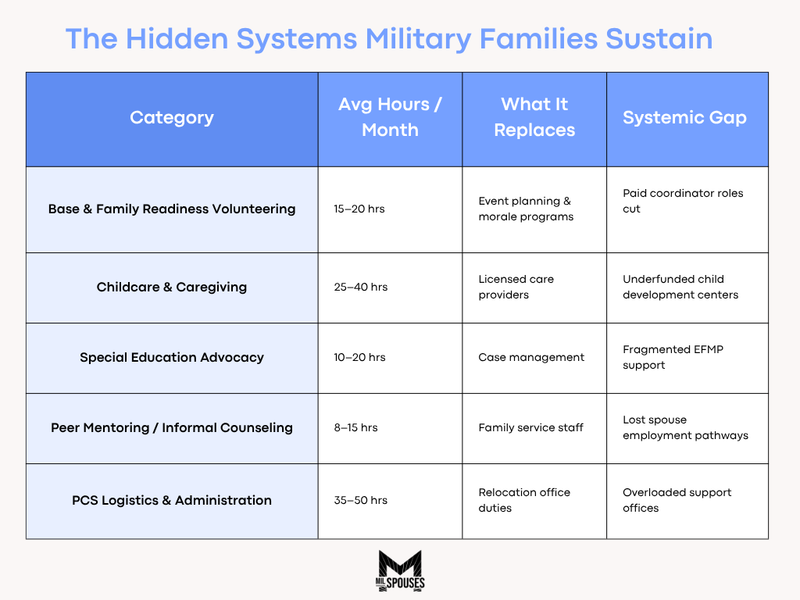BEYOND “RESILIENT”: WHAT MILITARY FAMILIES REALLY WANT YOU TO HEAR
COMMENT
SHARE

ADVERTISEMENT
When someone becomes a military spouse, they enter a community that often works behind the scenes to support service members and their families. Jennifer Barnhill’s new book, The Military Stories You’ve Been Told and the Ones You Need to Hear, is dedicated “to the hidden, all-volunteer force,” a nod to those whose contributions are rarely seen but remain essential to military life.
Barnhill’s work highlights the everyday realities that are often left out of official reports and promotional materials. Through stories shared by spouses, children, and families across duty stations, she explores the personal challenges and resilience that shape military family life—and why these perspectives matter to leaders and communities alike.
MilSpouses.com chatted with Jennifer to learn more about the stories featured in her book, as well as what inspired the redacted cover. Throughout the process of writing this book, Barnhill conducted over 1,000 first-person interviews with military families, uncovering the ugly and uncomfortable human experiences that too often go untold. When asked about her inspiration, Barnhill said,
“The people problems amongst the people in the military were the threads I pulled on. That’s what inspired this book.”

About Jennifer Barnhill
Jennifer Barnhill, MPA, is a Navy spouse, journalist, and the 2025 Armed Forces Insurance Navy Spouse of the Year. She’s a columnist for multiple esteemed publications, the host of Military Dinner Table Conversations, and a 2023 Bush Institute Stand-To Veteran Leadership Program Scholar.
As the former chief researcher at Partners in PROMISE, Barnhill studied the realities of families navigating special-education services and the deep cracks in military support systems.
Her journalism asks a simple but urgent question: What are we ignoring, and who is paying the price?
Nobody Prepared You for Military Life
But we can help. Join over 100k spouses already getting the advice, resources, and military tea they need to thrive.
Resilience Isn’t the Story
“The definition of resilience is springing back to your original shape,” Barnhill says. “I don’t know anyone who’s gone through something hard and comes back to their original shape, just as they were before.”
Experiences change us. Human experiences are both common and unique, especially in military families. For military spouses, Barnhill believes 'resilience' has lost its meaning.
“It’s turned into a toxic measurement that’s doing more harm than good,” she says. “Tough or gritty fits better. Tough acknowledges the hardship. I didn’t come back to my original shape, and neither did anyone I know.”
Her deeper point is about expectation.
“We’re conditioned to expect things to be broken,” she adds. “And that conditioning becomes an excuse not to fix them.”
When broken systems are normalized, the language of “resilience” can become an excuse to ignore real problems. Barnhill’s work reframes the solution: strength is not the goal; listening and meaningful change must be.
The Cost of Invisible Labor
Barnhill has long examined the unpaid work that sustains the military community. Spouses lead Family Readiness Groups, organize volunteers, and provide childcare, often unrecognized and unpaid. Even a rough estimate of these hours could help policymakers understand the cost of relying on spouses' volunteerism. These contributions amount to millions of hours annually, forming a crucial, often-overlooked economic base for military life.
"Until 1988, how your family behaved and volunteered impacted officer promotions," she explains. "Now it's unofficial, but the pressure still exists. We're told it's our choice, but is it really?" Jennifer adds, “Some spouses volunteer because they love it. Others because they feel they have to.”
The support gap grows even wider. For example, active duty service members with able-bodied spouses don’t have to fill out care plans, because it’s assumed their spouses are the care plan.
“The last paid family-readiness position was in the Marine Corps, and it was cut this year,” she says. “Now that work is just collateral duty for an officer or an unpaid obligation for a spouse.”
It’s a revealing truth: even without formal policy, the pressure remains. Many spouses still feel that their family’s image, availability, or participation could quietly influence a service member’s career.
“We are equally as important as the service member when it comes to readiness,” she says. “But our value shouldn’t depend on our unpaid labor.”
Barnhill believes this expectation is part of a bigger cultural blind spot. It also affects how belonging and fairness are experienced throughout the military.
“We talk about ‘taking care of our own,’” Barnhill says, “but that doesn’t mean pretending everyone’s experience is the same.”
She’s referring not only to racial and cultural disparities but to the unspoken hierarchies within military life itself, between those who can afford to volunteer and those who can’t, between families who fit the traditional mold and those who don’t.
“We rely on too many band-aids,” she explains. “We need upstream solutions that fix the root problems before families reach crisis.”
For Barnhill, inclusion means making sure all voices are heard, believed, and supported. Whether it’s a spouse unable to volunteer or a parent navigating programs alone, she presses the crucial question: Who is missing from the conversation on readiness, and how do we ensure no one is left behind?
The Seat at the Table
Barnhill’s voice softens when she discusses what military families deserve. After all they endure: the moves, job losses, and unvolunteered hours; she believes they’ve earned something simple yet powerful: a seat at the table.
“Decisions that affect us should include us.”
Until recently, she explains, family councils gave spouses a real voice in policy.
“Those councils have been shuttered,” she says. “Families were ranked by participation, not partnership. Our value became symbolic. We deserve to be participants, not props.”
When asked what change she would implement right now, if she could implement just one thing, Barnhill doesn’t hesitate.
“Right now, we need to make sure people can put food on their tables. Let’s start there.”
ADVERTISEMENT
The Conversations That Still Need to Happen
“If things are hard, it’s not just one person’s hard, it’s community-hard,” Barnhill says. “We need to talk about those moments without fear. Bringing them up doesn’t mean you don’t care; it means you care enough to want it to be better.”
The more we speak up, the more normalized our experiences become, making them easier to open up about for the next family going through it.
Jennifer hopes readers will challenge her, disagree with her, and start conversations her book can’t finish.
“I hope people talk about the things they read that didn’t align with their thoughts,” she says. “That’s how we grow.”
So, what happens after readers finish the book?
“People need to be writing their own stories and sharing their own voices,” she says. “That’s how we can speak louder, together.”
Why These Stories Matter Now
Barnhill’s book shows that meaningful reform starts at kitchen tables, in Family Readiness Groups, and in honest conversations.
Her challenge to military families, leaders, and communities is simple yet profound: listen more deeply. The stories that feel uncomfortable are often the ones that reveal what’s worth saving. The silence that protects the system also prevents it from healing.
Barnhill isn’t asking families to be louder for attention; she’s asking them to be heard for change.
She asserts that the future of military family life must be built on honesty about the true costs of service. Surface-level messages are insufficient; meaningful reform requires a commitment to listening and change at the most personal level.
Read the stories. Share your own. Amplify the quiet voices. Question what’s “normal.” If you see something broken, act, share it, demand better, and encourage others to join you. Your voice is needed now.
Every untold story keeps another family invisible. When we speak up, we not only strengthen our community, but we also ignite change.
“Change doesn’t start with policy; it starts with people,” Barnhill says. “And when people start telling the truth, systems have no choice but to listen.

Suggested reads:
Join the Conversation
BY NATALIE OLIVERIO
Veteran & Senior Contributor, Military News at MilSpouses
Natalie Oliverio is a Navy Veteran, journalist, and entrepreneur whose reporting brings clarity, compassion, and credibility to stories that matter most to military families. With more than 100 published articles, she has become a trusted v...
- Navy Veteran
- 100+ published articles
- Veterati Mentor
ADVERTISEMENT
ADVERTISEMENT




